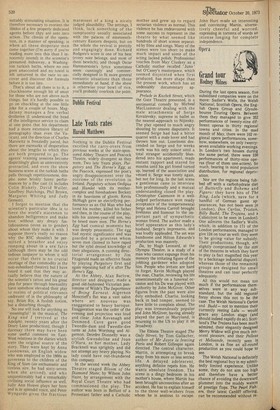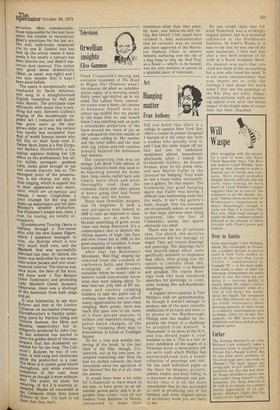Opera
Grand tour
Rodney Eines
During the last opera season, five subsidised companies were on the move: Sadler's Wells, the Welsh National, Scottish Opera, the English Opera Group and Glyndebourne Touring Opera. Between them they managed to give 352 performances of twenty-nine different operas in thirty regional towns and cities. In the mad month of May, there were 102 regional opera performances, somehow, somewhere, on only twentyseven available working evenings. In London's two houses during the same period, there were 336 performances of thirty-nine operas (four of them one-acters). So much, bearing in mind population distribution, for regional deprivation.
Nor are the regions being fobbed off with a carbohydrate diet of Butterfly and Boheme and Figaro: they have bits of The Ring, Lulu (which, save for a handful of German guest appearances, has not been seen jo London), Don Carlos, Tristan, Billy Budd, The Trojans, and a Calisto)yet to be seen in London). One admires the Sadler's Wells, which, in addition to 171 of the London performances, managed to give 124 on tour as well: they seem to be giving value for subsidy. Their productions, though, are slightly compromised by the size of the theatres in which they have to play (a fact magnified this year by a backstage industrial dispute), whereas those of the remaining groups are designed for small theatres and can tour perfectly adequately.
All this would not mein ton much if the performances themselves were in any way substandard, but the odd regional foray shows this not to be the case. The Welsh National's Carlos and Budd— not to mention their currently resting Lulu — would grace any London stage (and should indeed rapidly do so). Scotland's The Trojans has been much admired, their elegantly designed Merry Widow will give much innocent pleasure, and their Pelleas et Mel isande, recently seen in London, is as fine an all-round production as you could hope to see.
The Welsh National is definitely the best regional buy in my admittedly limited experience. Unlike some, they do not aim too high and therefore have a better chance of avoiding the downward plummet into the muddy waters of prestige flops. The Pearl Fishers, their latest Cardiff offering, can be recommended without re Servation. Most commendably, those responsible for the text have taken the trouble to reconstruct Bizet's intentions for the last act. The dull, ludicrously misplaced trio by one B. Godard that has held up the action where it least needs it for nearly a century has been thrown out, and Bizet's rapturous duet restored. This makes very good sense dramatically (Bizet, as usual, was right) and I can only wonder that it hasn't been done before.
The opera is exceptionally well conducted by David Atherton, and sung in a straightforward English translation by Nell and John Moody. The principals cope efficiently with music that is anything but easy. Kenneth Collins's singing of the murderously exPosed Act 1 romance will doubtless grow surer as the year grows older; as it was, his version was hardly less successful than that of world famous tenors who fall flat on their faces over it. Delme Bryn-Jones is a fine Zurga, and Barbara Shuttleworth, a Canadian soprano making her UK debut as the professional, but alltoo fallible, surrogate goddess Leila, looks good enough to eat and sounds scarcely less so. The strongest point of the presentation is the chorus, not only in their singing, which is superb, but in their appearance and movement, which are un-operatic and almost, I swear, Cinghalese: a joint triumph for the wig and Make-up department and for John Mooday's sensible production. Sue Plummer's simple sets, ideal, I trust, for touring, are notably atmospheric.
Glyndebourne Touring Opera is halfway through a five-centre stint with the new Sussex Figaro, Which I somehow managed to Miss, the Boheme which is now very much theil. own, and the Macbeth that was successfully televised last year. At Oxford, the Fatter was bedevilled by too many inter-scene pauses and one unannounced interval. The chorus was, once more, the hero of the hour, and there were a fine Banquo (John Tomlinson) and promising Lady Macbeth (Janet Jacques). Otherwise, there was a shortage of the daemonic from both stage and pit. It was interesting to see their Boheme and that at the London Coliseum on successive evenings. GlYndebourne's is frankly undersung (save by Patricia Greig and Victoria Sumner, the Mimi and Musetta respectively) but int'lligently produced by John Cox. At last someone has started to Mine the golden detail of this mas,terpiece that has slumbered unneeded for far too long. The Coliseum's Boheme, by way of contrast; is well sung and conducted, While the production is a joke. he Mimi is in patent good health throughout, and while everyone complains of the cold, most behave as though it were midsummer. The event, let alone the meaning, of Act 2 is scarcely attempted. Maybe all concerned at t,ne Coliseum think they know
oheme by now. I'm here to tell them that they don't.



































































 Previous page
Previous page